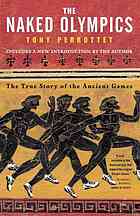
The Naked Olympics
The True Story of the Ancient Games
کتاب های مرتبط
- اطلاعات
- نقد و بررسی
- دیدگاه کاربران
نقد و بررسی

April 12, 2004
Combining a wealth of vivid details with a knack for narrative pacing and subtle humor, Perrottet (Pagan Holiday
) renders a striking portrayal of the Greek Olympics and their role in the ancient world. While our modern games certainly pay homage to the Greek festival that was held uninterrupted for more than 1,200 years, the book's title refers to the most pronounced difference between the two: Ancient athletes competed in the nude, adorned only with olive oil. While Perrottet also outlines events ranging from the merciless chariot races to the pankration—a sort of early predecessor of ultimate fighting in which strangulation was seen as the surest means of attaining victory—he also puts the games in their heavy religious context and gives readers a strong sense of what they were like from a spectator's point of view. That they were cramped, hot and dizzyingly unsanitary apparently did little to dissuade throngs of people from the often treacherous journey to Olympia to catch glimpses of their heroes. And their experiences provided by Perrottet are what separate this book from staid history. His goal, he writes at the outset, is "to create the ancient games in their sprawling, human entirety," so readers are treated not only to a thorough picture of the games' proceedings but also to glimpses of the shameless bacchanalia, numerous (and often lascivious) entertainments and even corruption that accompanied them. It's an entertaining, edifying account that puts a human face on one of humanity's most remarkable spectacles. Agent, Elizabeth Sheinkman.

August 1, 2004
Neither the title nor the subtitle does justice to Perrottet's (Pagan Holiday) engaging work. This lay reader's guide to the ancient games at Olympia presents events as they were scheduled, moving from the athletes' required preparations to the closing ceremonies and the spectators' trip home. Within this framework, he also describes the buildings, the sponsors, and what it was like for the fans in attendance. Employing numerous sources (poorly referenced, alas), Perrottet describes the 1000 years of games, how the Mediterranean world viewed the contests and the participants, and what that might say about the concomitant cultures. The illustrations reveal an idea of the importance the games played in Greek and Roman art, and Perrottet gives generous literary references, from the games' Homeric foundations to the beautiful poems written about the athletes over the centuries. One comes away with an understanding of the role played by the games in the various cultures before Christians decided the contests celebrated the wrong gods and shut them down. Recommended for all public libraries. Clay Williams, Hunter Coll., New York
Copyright 2004 Library Journal, LLC Used with permission.

























دیدگاه کاربران